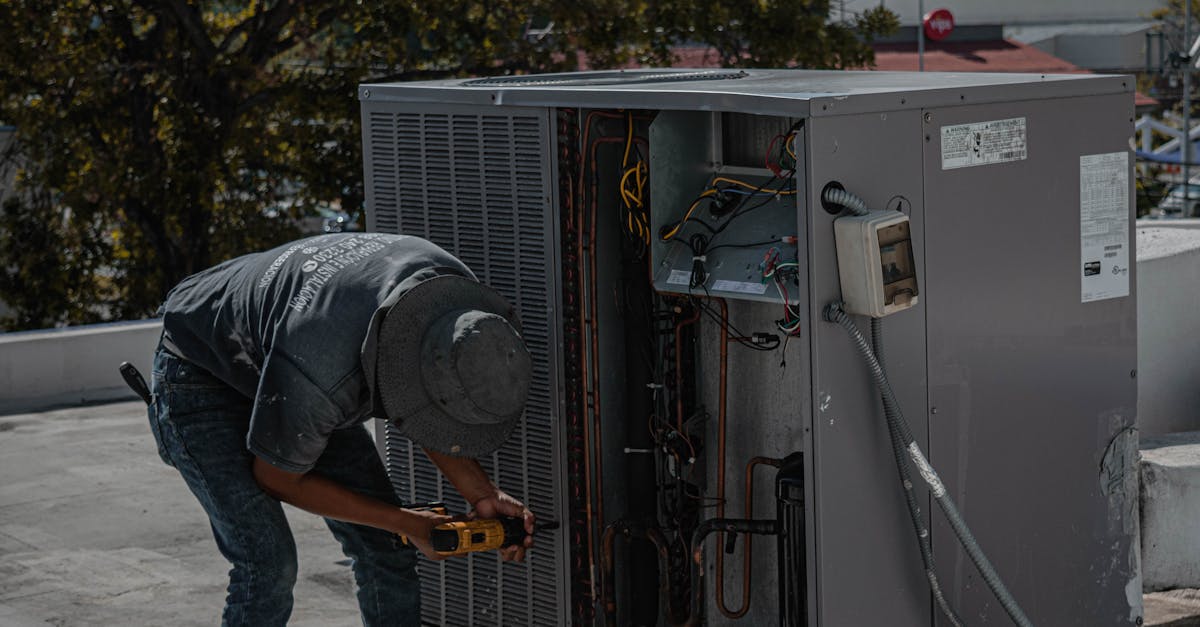
Climate Considerations
The climate in which a commercial building operates plays a crucial role in determining the most suitable HVAC system. Different regions experience varying temperature extremes, humidity levels, and seasonal changes. This diversity necessitates careful consideration during the selection process. Business owners must assess how these factors impact energy consumption and efficiency over time. Evaluation of local weather patterns can help in identifying systems that provide optimal performance year-round.
Commercial HVAC services are essential for ensuring that the chosen system can handle the specific climate demands of the area. Professionals in this field can offer insights on equipment that excels under particular conditions, whether it be extreme heat or chilly winters. Properly chosen and maintained systems can significantly enhance energy efficiency and reduce operational costs. With an informed approach to climate considerations, businesses can achieve better comfort levels for employees and customers alike.
Adapting HVAC Systems to Local Weather
When selecting an HVAC system for a commercial building, understanding the local climate is crucial. Different regions face unique weather patterns, such as extreme heat, cold, or humidity levels. An effective HVAC solution must accommodate these environmental conditions to ensure optimal performance year-round. Commercial HVAC services can assess these factors, recommending systems designed to handle specific challenges, such as larger compressors for hot climates or efficient heating elements for colder regions.
The ability to adapt HVAC systems to local weather not only enhances comfort but also contributes to energy efficiency. Systems equipped with variable-speed motors can adjust airflow based on external temperatures, reducing energy consumption during mild weather. By working with experienced commercial HVAC services, building owners can ensure that their systems are tailored to provide reliable comfort while minimizing operational costs. Customization based on climate considerations leads to better longevity of the equipment and improved overall indoor air quality.
Comfort Levels and Air Quality
Maintaining optimal comfort levels in a commercial building is crucial for employee productivity and client satisfaction. An effective HVAC system plays a significant role in regulating temperature and humidity, ensuring a pleasant indoor environment. Factors such as insulation, air circulation, and temperature control equipment must be taken into account. Regular maintenance and timely upgrades through reliable Commercial HVAC Services can help in sustaining a comfortable atmosphere year-round.
Air quality is another critical aspect of the indoor environment that often goes overlooked. Poor air quality can lead to various health concerns and decreased performance among occupants. Advanced filtration systems, along with ventilation solutions, can significantly enhance the air quality in commercial spaces. Utilizing specialized Commercial HVAC Services allows businesses to implement these air purification strategies effectively, promoting a healthier work environment and improving overall well-being.
How HVAC Systems Affect Indoor Environment
HVAC systems play a crucial role in determining the indoor environment of a commercial building. They regulate temperature, humidity, and air circulation, influencing overall comfort and productivity levels. A well-designed HVAC system can filter out dust, allergens, and other pollutants, significantly enhancing indoor air quality. Similarly, maintaining optimal humidity levels helps prevent mold growth, which can be detrimental to both health and building integrity.
Effective commercial HVAC services ensure that systems are tailored to meet the specific needs of the space. Regular maintenance and timely upgrades can create a more comfortable atmosphere while reducing energy consumption. This not only leads to savings on utility bills but also supports a healthier indoor environment, aligning with the growing emphasis on sustainability in commercial real estate. By focusing on these factors, businesses can promote better health and enhance employee morale.
Technology Integration
The integration of technology into commercial HVAC systems has transformed the way businesses manage climate control. Modern systems now often include smart thermostats, zoning controls, and building management systems that allow for precise temperature regulation and energy usage monitoring. With the aid of software, operators can analyze data trends, optimizing performance and addressing issues before they affect overall functionality. Moreover, integrating these advanced technologies can lead to significant cost savings over time due to improved energy efficiency.
For companies seeking professional support, Commercial HVAC Services provide expertise in implementing and maintaining these smart solutions. These services assist businesses in selecting the right technology that aligns with their operational needs and facility structure. With ongoing advancements in HVAC technology, professionals can ensure that systems remain up to date, thereby enhancing both energy efficiency and indoor comfort while reducing environmental impact.
Smart HVAC Solutions for Commercial Use
Advancements in technology have paved the way for smart HVAC solutions that enhance efficiency and optimize energy usage in commercial buildings. These systems often incorporate advanced sensors and smart thermostats, allowing for real-time monitoring and adjustments based on occupancy and environmental conditions. The integration of these technologies can significantly reduce operating costs while maintaining comfort levels across various zones within a facility.
Commercial HVAC services are increasingly equipped to implement these smart systems, providing tailored solutions that meet the unique needs of each business. By utilizing data analytics, these services can identify patterns that inform maintenance schedules and system performance. This proactive approach not only ensures continual operation but also improves air quality, creating a healthier indoor environment for employees and clients alike.
FAQS
What factors should I consider when choosing an HVAC system for a commercial building?
Key factors include climate conditions, the size and layout of the building, comfort levels required, air quality needs, and technology integration options.
How does climate impact the effectiveness of an HVAC system?
The local climate influences heating and cooling demands, which can affect system efficiency. For example, systems in hotter climates may prioritize cooling, while those in colder climates need strong heating capabilities.
What is the importance of air quality in commercial HVAC systems?
Good air quality is essential for the health and productivity of building occupants. HVAC systems play a crucial role in filtering air, controlling humidity, and ensuring adequate ventilation.
Are smart HVAC solutions worth the investment for commercial buildings?
Yes, smart HVAC solutions can lead to significant energy savings, enhanced comfort, and better air quality management, making them a worthwhile investment in the long run.
How can I determine the right size HVAC system for my commercial building?
It's best to consult with an HVAC professional who can perform a load calculation based on factors like building size, occupancy, insulation, and local climate to determine the appropriate system size.
